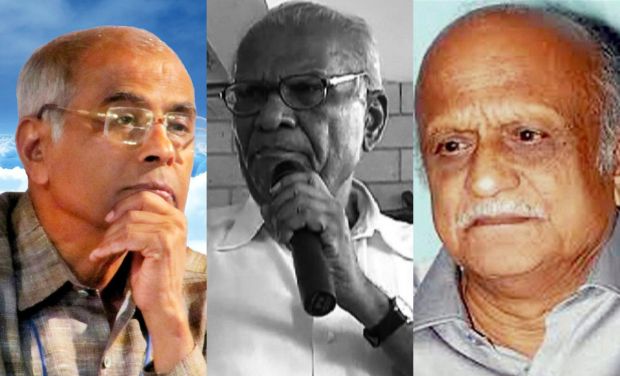

Follow us on:  
|


Indian rationalist thinkers Narendra Dabholkar, Govind Pansare and writer Malleshappa Kalburgi
Pen International has backed the dissenting writers and artists in India who are protesting against what the organization described as “a climate of growing intolerance in India”.
PEN is an international organisation that defends freedom of expression and advocates on behalf of writers persecuted because of their work.
In a statement on Saturday, PEN said delegates from 73 countries from across the globe called on the government of India to “safeguard free speech as guaranteed by the Indian constitution”.
PEN International President, John Ralston Saul, has written a letter to the Indian Prime Minister and one of India’s highest literary bodies, the Sahitya Akedemi, urging the Indian government to take “immediate steps” to protect the rights of everyone, including writers and artists.
The French satirical weekly Charlie Hebdo, targeted in a deadly attack earlier this year by Islamist gunmen, was honored in May by PEN.
More than 40 writers and artists have returned top national awards in a protest against what they call a “climate of intolerance” in India over the past few weeks.
This follows a series of incidents of communal violence and attacks on intellectuals and rationalists in various parts of the country by groups allegedly linked to the right-wing party in power in India.
The ruling Bharatiya Janata Party (BJP) won power in a landslide election victory in India in 2014.
In an Independence Day speech earlier this summer, the Indian Prime Minister Narendra Modi had said, “Be it casteism or communalism there is no place for them. In no way can they be tolerated. If the unity of India is destroyed then the dreams of the people are also destroyed.”
More than 40 poets, novelists, playwrights have returned awards from the country’s most prestigious literary institution, the Sahitya Akademi.
The writers have said they are pained and angered by the murder of rationalist thinkers and the rise of communal tensions in the country.
Writer Malleshappa Kalburgi was killed by unidentified gunmen in the southern state of Karnataka in August. Kalburgi had been critical of superstitious rituals in the Hindu faith in his writings. The local police have now said the probe into his death has reached a “dead-end”.
“Kalburgi was the recipient of one of India’s highest literary awards, the Sahitya Akademi Award, and yet, after his murder, the Akademi remains silent even as its members resign in protest, and several award-recipients return their awards,” said the PEN statement on Saturday.
“Two government ministers have questioned the motives of the writers returning the awards. It takes courage in the current climate in India to express public dissent in a public manner. PEN International salutes the courage of and expresses solidarity with those who have returned their awards in protest or resigned their membership of the Akademi or its governing council,” it added.
![[Sahitya Akademi, India]](http://thebricspost.com/wp-content/uploads/2015/10/akademi-300x167.jpg)
[Sahitya Akademi, India]
The writers’ body also criticized the Indian government for not reining in some of its ministers who have made “disturbing” comments since the protests began.
“If they (the writers) say they are unable to write, let them first stop writing. We will then see,” said Indian Minister of Culture Mahesh Sharma reacting to the protests.
“As the most populous democracy in the world, PEN International expects India to live up to the high ideals of its constitution so that every Indian can live in a land where “the mind is without fear and the head is held high,” said PEN quoting Indian literary giant Rabindranath Tagore.
TBP